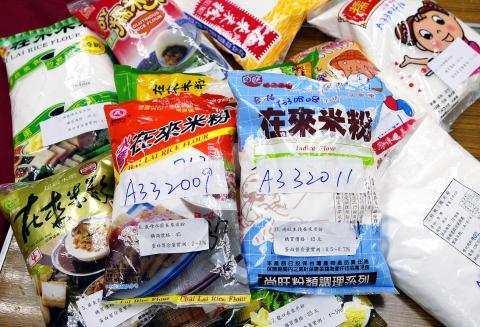Popular rice-based products, such as turnip cakes, glutinous rice balls and mochi, might contain less of the grain than their labels suggest, test results released by two consumers’ rights organizations showed yesterday.
Among the 29 samples of rice and glutinous rice flour from different millers and traders tested, 11 were found to contain a lower volume of rice than stated on their labels, according to the results of a joint inspection conducted by the Consumers’ Foundation and the News and Market online news service in late January.
Regulations state that pure rice flour should have a protein content of 7 percent per portion, but allow a 20 percent margin of error, which sets the minimum protein level at 5 percent. However, the report showed that the protein content of the 11 substandard samples was between 0.5g and 5g per 100 grams, beneath the minimum level.

Photo: Chien Jung-fong, Taipei Times
Four samples were even found to contain less than 2 percent protein, the foundation said.
Moreover, the New Taipei City (新北市)-based China Grain Products Research and Development Institute found that the 11 rice-based products also contained “unknown starches,” the news service said.
The news site urged the producers of the items to reveal what the starch is to clarify if it is a type of chemical food additive.
Some people are allergic to certain types of starches, which is why it is important for the producers to identify the unknown substance in the 11 products, said a spokesman for the Greater Taichung-based news site, which focuses on issues concerning agriculture, food and the environment.
The Consumers’ Foundation said that the samples were collected from traditional markets, shopping malls, supermarkets, wholesale baking supply stores and shopping Web sites in Taipei, New Taipei City and Greater Tainan.
It was the second such investigation conducted by the organizations this year.
In January, they released a report showing that nearly 90 percent of rice noodle products sold in supermarkets do not contain as much rice as their makers claim on the product labels, with 45 out of the 52 vermicelli brands tested discovered to contain less than 50 percent rice — the minimum standard for rice noodles.

Alain Robert, known as the "French Spider-Man," praised Alex Honnold as exceptionally well-prepared after the US climber completed a free solo ascent of Taipei 101 yesterday. Robert said Honnold's ascent of the 508m-tall skyscraper in just more than one-and-a-half hours without using safety ropes or equipment was a remarkable achievement. "This is my life," he said in an interview conducted in French, adding that he liked the feeling of being "on the edge of danger." The 63-year-old Frenchman climbed Taipei 101 using ropes in December 2004, taking about four hours to reach the top. On a one-to-10 scale of difficulty, Robert said Taipei 101

Nipah virus infection is to be officially listed as a category 5 notifiable infectious disease in Taiwan in March, while clinical treatment guidelines are being formulated, the Centers for Disease Control (CDC) said yesterday. With Nipah infections being reported in other countries and considering its relatively high fatality rate, the centers on Jan. 16 announced that it would be listed as a notifiable infectious disease to bolster the nation’s systematic early warning system and increase public awareness, the CDC said. Bangladesh reported four fatal cases last year in separate districts, with three linked to raw date palm sap consumption, CDC Epidemic Intelligence

Two Taiwanese prosecutors were questioned by Chinese security personnel at their hotel during a trip to China’s Henan Province this month, the Mainland Affairs Council (MAC) said yesterday. The officers had personal information on the prosecutors, including “when they were assigned to their posts, their work locations and job titles,” MAC Deputy Minister and spokesman Liang Wen-chieh (梁文傑) said. On top of asking about their agencies and positions, the officers also questioned the prosecutors about the Cross-Strait Joint Crime-Fighting and Judicial Mutual Assistance Agreement, a pact that serves as the framework for Taiwan-China cooperation on combating crime and providing judicial assistance, Liang

US climber Alex Honnold left Taiwan this morning a day after completing a free-solo ascent of Taipei 101, a feat that drew cheers from onlookers and gained widespread international attention. Honnold yesterday scaled the 101-story skyscraper without a rope or safety harness. The climb — the highest urban free-solo ascent ever attempted — took just more than 90 minutes and was streamed live on Netflix. It was covered by major international news outlets including CNN, the New York Times, the Guardian and the Wall Street Journal. As Honnold prepared to leave Taiwan today, he attracted a crowd when he and his wife, Sanni,